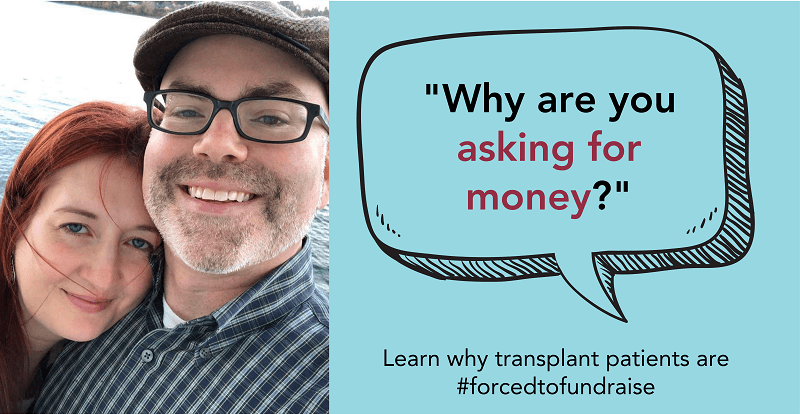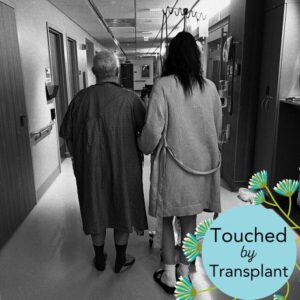
Wife and stepmom Elizabeth Burrus Barnett is waiting for a heart and liver transplant. Fundraising has become a critical component of her transplant journey. On her blog, The Feisty Fontan, she recently explained why fundraising is a part of the transplant process for her and so many other patients.
Here are a few of her firsthand insights:
Why do you have to fundraise for a transplant?
Fundraising is a requirement for almost all transplant candidates.
Part of the transplant process is meeting with a social worker and a financial coordinator to discuss how you’re going to pay for all these expenses. These people are then involved in the committee that decides if you get approved for organ listing or not.
Someone’s financial situation could be a matter of life or death. Someone could receive the gift of life, survive one of the biggest surgeries someone could have, get a second chance at living a healthy life, and then years down the road something happens and now they can’t afford the anti-rejection meds they need to keep living.
Doesn’t insurance cover transplant costs?
There are so many expenses surrounding receiving a transplant that insurance doesn’t cover.
They are expenses that an average person wouldn’t even think about, and there are lifelong expenses that a transplant patient will carry.
What about Medicare?
Do you want to pay for 20% of a $1.4 million dollar procedure?
When I got approved for disability, I also got approved for Medicare. I thought it would be my saving grace and I would never need to worry about insurance coverage ever again. I was naïve.
Medicare Part B is what pays for hospital expenses and it covers 80% and you pay 20%. Sounds like normal health insurance, right? Except there is not an out-of-pocket max on that 20%…and an average heart transplant costs $1.4 million dollars.
Medicare Advantage plans are based on the state you live in–no plans were contracted with my transplant center. Medigap plans, if you are under 65, are pricey.
How much do post-transplant medications cost?
You can’t wait two days until payday to get your meds refilled.
Almost everyone has heard horror stories about the cost of anti-rejection medications. Insurance doesn’t always cover them, or if they do, they have high co-pays.
I currently take about 15-20 pills a day and I will take more than that afterwards. As of right now, one of my potential medications is estimated to be $500 a month. I have heard of transplant recipients that pay $5,000 a month for their anti-rejection meds.
Your meds can change. If the organs are experiencing signs of rejection, your doctors may increase your dosage or change the meds that you’re on. A higher dose usually comes with a higher cost and the new medications may not be covered by insurance.
There are meds that you will take every day for the rest of your life, twice a day, at the same time each day. There is no skipping a dose or taking it later: doing so can start the rejection process.
Are there other unexpected costs?
I owed a five-digit figure…
Transplants involve so many medical professionals. Just during the evaluation process, I met with nutritionists, specialized pharmacists, infectious disease specialists, and a psychiatrist. Every test I had needed insurance approval and it wasn’t always easy to get.
I’ve already had one life-threatening emergency air ambulance ride that my insurance denied and was out of network of my insurance. That was a very high five-digit figure I owed.
What about transplant-related relocation?
You must stay local for anywhere from 6 weeks to 6 months post-transplant.
Every transplant candidate is required to live less than about 4 hours from their center or have air support arranged that can get them to the transplant center in less than 4 hours. In my case, my transplant center is almost 7 hours away, and they won’t even list me until I’m physically there, but it’s the only center in the country that would be willing to do a transplant on me.
Top-notch world-class transplant centers aren’t located in small towns with affordable living costs: they are [often] in big cities with rents that average more than twice a reasonable mortgage payment.
What about FMLA?
FMLA is usually unpaid after their PTO runs out.
You are required to designate a primary caregiver who receives extensive training before you leave the hospital. You are required to have an adult with you 24/7 for at least three months post-transplant.
FMLA is usually unpaid after their PTO runs out, like in my husband’s case. When his PTO runs out and he has no paycheck, we will be responsible for paying our health insurance premiums out of pocket.
If an employee exhausts FMLA and can’t return to work, then they could lose their job. And losing their job means losing their insurance.
Your costs will go down after the transplant, right?
Expenses don’t end after you get to go home.
You must make frequent visits to your transplant center for bloodwork, biopsies, etc. You’re there at least once a month for the first year, and you have to be [monitored] at the center that transplanted you. This girl will be making the drive for the rest of her life.
Life doesn’t stand still no matter what we are dealing with. The mortgage still needs to be paid. The kids still need school supplies and money for field trips. The dog still needs heartworm meds. The car still needs an oil change and a tire rotation.
Why are you fundraising with Help Hope Live?
When I knew I needed to fundraise, I wanted to do it in the most transparent, ethical and legit way I could.
That’s why I chose to use Help Hope Live to fundraise. They’re a nonprofit, so all donations are tax deductible, and they manage the money to ensure that all money raised goes towards nothing but transplant-related expenses.
I wanted anyone who opened up their wallet to help me to be confident that their money was going only towards keeping me alive.

Need help fundraising for a transplant?
We are grateful for firsthand insights from transplant candidates like Elizabeth that help to illuminate why so many patients are forced to fundraise to meet their medical needs.
If you know someone who is struggling with pre- or post-transplant expenses, refer them to our nonprofit for assistance:
Written by Emily Progin










